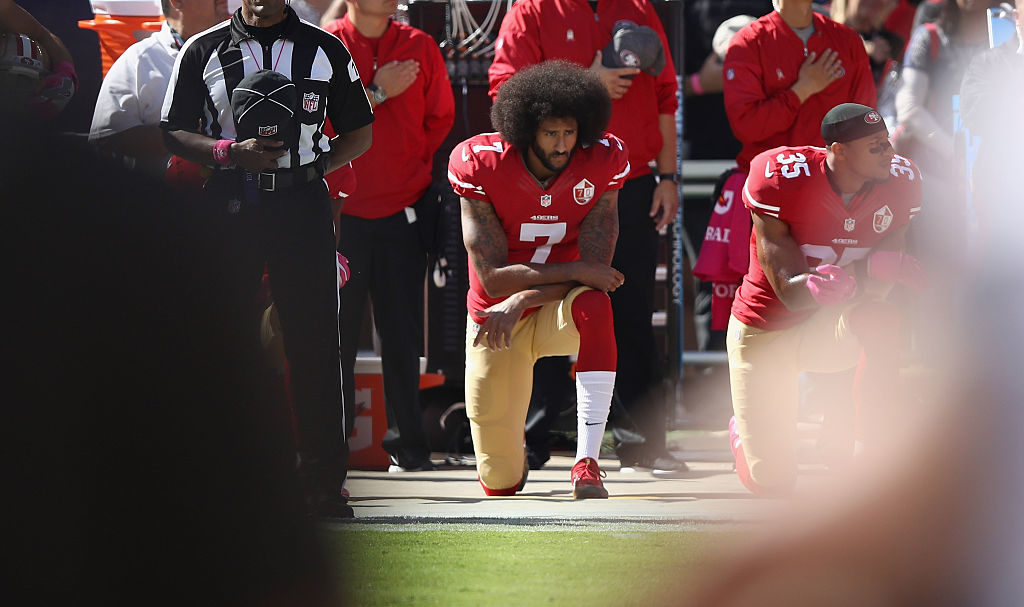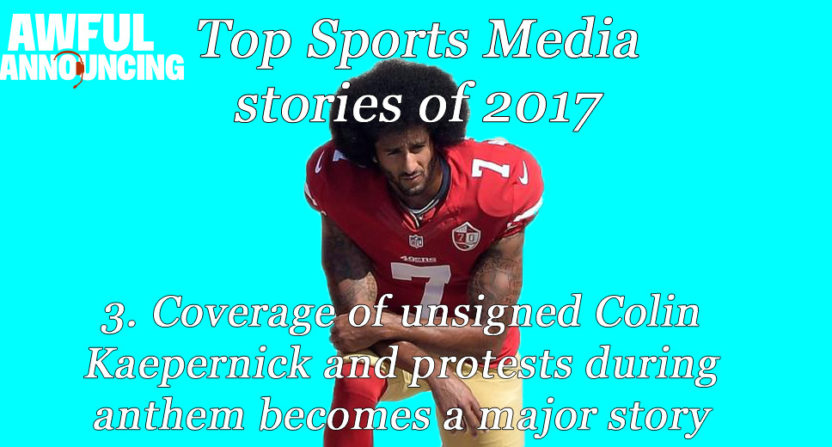Two of the biggest sports media stories of 2017 started off slow, and even existed before the year began, but kept snowballing and expanding as the year went on. That would be coverage of Colin Kaepernick not being signed by a NFL team, plus what he wound up doing outside the league, and coverage of those in the NFL who continued protests during the national anthem. Those stories wound up being two of the major sports media themes of this year, and they may continue to play a big role in 2018.
With Kaepernick, the year started with him still under contract to the San Francisco 49ers following a season where he regularly knelt in protest of racial inequality during the national anthem. In January, his 49ers teammates voted him as the winner of the Len Eshmont Award for courage and inspiration. Kaepernick then opted out of the final season of his reworked deal in March to become a free agent, and later that month, new San Francisco general manager John Lynch and new head coach Kyle Shanahan said they’d previously told Kaepernick they didn’t want him as the starter, didn’t want him back at his current cap hit, and were planning to cut him if he didn’t opt out.

At first, it looked likely that Kaepernick would find another team, for a backup role with limited pay at the very least. In 2016, he threw for 2,216 yards with a 59.2 per cent completion mark, 16 touchdowns and four interceptions. That alone (to say nothing of his previous seasons of success) was more impressive than numerous starters elsewhere, and definitely more impressive than many of the quarterbacks signed as backups this offseason. But as time passed, no one signed Kaepernick. President Donald Trump bragged during a rally later in March that he was a reason no one had picked up Kaepernick. In April, 49ers teammates expressed some surprise Kaepernick hadn’t found a new team, and his former coach Jim Harbaugh wrote a glowing Time 100 profile of him.
May saw Kaepernick pass out suits to at-risk individuals outside a New York City parole office and donate a jersey he wore during his protest to the Smithsonian. Meanwhile, the media speculation about him being blackballed continued to grow. Kaepernick’s camp said during May they’d heard from three NFL teams, and he actually worked out for the Seattle Seahawks, but they didn’t opt to sign him. And New York Giants’ co-owner John Mara said his team wouldn’t sign Kaepernick thanks to the letters of protest they’d received.
As the summer went on and further quarterbacks were signed, it became more and more clear that no team was going to sign Kaepernick (aided by stories like the Ravens wanting to bring him in, but being turned down by owner Steve Bisciotti), leading to players like Malcolm Jenkins, Richard Sherman and Michael Bennett criticizing the league and to more and more Kaepernick takes from media figures.
From Michael Vick’s argument on FS1 that Kaepernick should get a haircut to Ray Lewis’ argument that players shouldn’t let the public know what they do off the field to Dick Vitale’s take that it’s unfair to see Kaepernick blackballed to Saturday Night Live discussing the rally Kaepernick’s supporters held outside NFL headquarters, Kaepernick’s non-employment in the NFL was everywhere with the season approaching. Even baseball great Hank Aaron chimed in to say Kaepernick was “getting a raw deal.”
The omnipresence of the Kaepernick story continued in September, and FS1 (home to the previous hot takes from Vick and Lewis, amongst others) took center stage. Lewis blamed a tweet from Kaepernick’s girlfriend for the Ravens’ decision not to sign him, which got plenty of attention, but Jason Whitlock created even more of a stir by tweeting a photo of Christopher Reid (Kid from Kid N’ Play) dressed as Kaepernick and giving a black-gloved salute in a sketch for Speak For Yourself. Amazingly, the sketch never actually aired, with a source telling Deadspin’s Tom Ley “the producers of Whitlock’s show made a collective decision to spike the segment because it didn’t meet their standards.”
The latest
With quarterback injuries and poor play rising in the NFL this fall, there were again some media discussions of teams bringing in Kaepernick, but coaches like Green Bay’s Mike McCarthy got mad at anyone who raised the prospect. Instead, the Packers struggled with the likes of Brett Hundley, who set a NFL record this week for the most passes thrown at home without a touchdown (162). The closest Kaepernick got to signing was a report from a fake Adam Schefter account, which fooled even Don Van Natta Jr. and Peter King. Meanwhile, Kaepernick filed a CBA grievance accusing the NFL owners of collusion, signed a book deal, and received prominent year-end awards from the likes of GQ and Sports Illustrated. And he’s still in the news, especially around Diddy’s planned bid to buy the Carolina Panthers. Don’t expect Kaepernick stories to go away in 2018.
Meanwhile, the protests during the anthem began as a story very much centered on Kaepernick in the fall of 2016, but those stories eventually diverged. Other NFL players like Jenkins, Mike Evans, Antonio Cromartie, and Brandon Marshall protested last fall, and protests showed up in NBA games, NCAA games, U.S. women’s soccer games and more. To start 2017, we saw different sports organizations from U.S. Soccer to American Legion baseball in Minnesota restrict or ban anthem protests, but there weren’t a whole lot of notable protests until the NFL preseason began. When that happened in August, though, the anthem story came back with a vengeance, and it wound up going to whole new levels well beyond 2016.
Several NFL players wound up protesting or showing support for protests in various ways during the preseason, including Bennett, Marshawn Lynch, Chris Long, Justin Britt, over a dozen Cleveland Browns players and more. Teams tried to find ways to balance players’ desire to protest and fans’ complaints about the protests, and didn’t always do so successfully. Protests continued once the season began, with the likes of Marcus Peters and Ameer Abdullah joining in, and Abdullah’s protest spawning racist backlash from a Lions’ fan who the team eventually banned. But things really took off in late September, when President Trump decided to use his speech at an Alabama rally for Republican Senate candidate Luther Strange to bash protesting NFL players:
“Wouldn’t you like to see one of these owners, when somebody disrespects our flag, to say, ‘Get that son of a bitch off the field right now, out, he’s fired. He’s fired!'”
In the wake of Trump’s comments, the protests went to a whole new level. A ton of NFL players knelt that weekend, and Oakland A’s catcher Bruce Maxwell and several U.S. women’s soccer players delivered protests of their own. Even Lewis wound up kneeling for the anthem, which drew backlash given his previous comments. The Pittsburgh Steelers tried to avoid the issue by having players stay in the locker room, but that led to its own controversy when Alejandro Villaneuva left to stand solo. Some players like Delanie Walker said they’d received death threats over protests. And NASCAR tried to preemptively ban protests, but Dale Earnhardt Jr. tweeted his support for them. At the end of September, the NBA tried to stop protests, but players still found ways to express their discontent.
The fever pitch of protests died down a little after September, but there were still plenty of notable flareups. In October, vice president Mike Pence flew to an Indianapolis Colts’ game, only to leave immediately when players protested during the anthem (and get mocked on SNL as a result). Former ESPN analyst Mike Ditka, previously seen telling protesters “get the hell out” in September 2016 and calling Kaepernick “unintelligent” in February, inserted himself into the conversation in a predictably dumb way, saying he’d bench protesters if he was still coaching and that there has been “no oppression” for 100 years.
In the NCAA, a quarterback at Division III Albright College was kicked off the team after kneeling during the anthem and two other players were booted for not following the team-wide plan to kneel during the coin toss instead, although all were eventually offered reinstatement after backlash. And the NFL protests kicked up again in late October after an ESPN report of Houston Texans’ owner Bob McNair making a comment about “inmates running the prison,” which led to most of the Texans’ roster kneeling.
In November, the protest story went from the field to the boardroom in a big way when Papa John’s founder John Schnatter and other executives blamed the NFL, its leadership and its lack of shutting down protests for a sales slump, possibly with some involvement from Dallas Cowboys’ owner and prominent Papa John’s franchise owner Jerry Jones. This led to white supremacists claiming Papa John’s as their official pizza, and the chain eventually distancing themselves from those supporters.
They also tweeted an apology for their protest comments, but did so two weeks after the fact. Oh, and Schnatter eventually said he’d step down as CEO following the hit Papa John’s business took after his protest-bashing. Meanwhile, other businesses like Pizza Hut said they hadn’t seen revenues affected by NFL protests. There were other corporate dimensions to the protests this fall, though, including some bars and restaurants refusing to show the NFL, DirecTV offering Sunday Ticket refunds to customers mad about protests, a New Orleans Saints’ season-ticket holder suing the team, and the Baltimore Ravens blaming attendance struggles on protests.
That last one is particularly notable, as it touches on the biggest media angle around the protests; what they did or didn’t mean for ratings. The NFL’s ratings are unquestionably down for most networks, but the impact of protests on that is disputed. Some studies and surveys have given protests a large role in that drop, and figures like Trump and Al Michaels have agreed. However, they’re only one of many possible reasons ratings are down, with league and media executives putting more emphasis on factors like oversaturation. It seems quite possible that protests and protest coverage have played at least some role in declining ratings, but the magnitude of that role is far from clear.
What is clear is that while the protest movement largely started with Kaepernick, it’s grown well beyond him at this point. It’s shown up in a wide range of other sports, and has spread throughout the NFL. And critical comments from the likes of Trump, McNair and Schnatter have often caused the protests to get even bigger, and in the latter two cases at least, backfired for those who made them.
We’ll see where protests go in 2018, but their significance as a sports media story seems far from over at this point. And regardless of what happens with Kaepernick this coming year, we’ll likely see a lot more discussion of protests.






